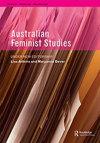水下的天气:黑暗、白人女权主义和令人窒息的大海
IF 1.5
4区 社会学
Q2 WOMENS STUDIES
引用次数: 11
摘要
这篇文章提供了一个女权主义者对“令人窒息的大海”的环保回应。通过仔细阅读克里斯蒂娜·夏普的。2016. 守灵:论黑暗与存在。杜伦:杜克大学出版社];艾德丽安富裕的。1973. “潜入沉船。”在《潜入沉船:1971-1972年诗歌》中。纽约:WW Norton;和亚历克西斯·波琳·冈布斯的。2018. M档案:世界末日之后。杜伦:杜克大学出版社),它探索了日益脆弱的海洋,既是环境破坏的场所,也是黑人女权主义诗学和白人女权主义之间的投机场所。一系列相互关联的论点展开了:(1)从夏普那里学习,天气不仅被理解为气候学,而且还被理解为反黑的“总气候”;(2)海洋不能不受天气的影响;水下的天气包括人为对海洋的危害(包括氧气消耗水平的增加),但也包括防黑的遗产;(3)从环境人文的角度看,里奇诗歌的“残骸”不仅是一种“被破坏的”性别秩序,而且是对海底生态的破坏;然而,白人女权主义很难注意到,这种“残骸”也是反黑人的。这篇文章以里奇和冈布斯在海底的相遇作为结尾。在这里,作为建立避难所项目的一部分,冈布斯邀请白人女权主义欢迎自己的部分解散。本文章由计算机程序翻译,如有差异,请以英文原文为准。
The Weather Underwater: Blackness, White Feminism, and the Breathless Sea
ABSTRACT This article offers a feminist environmental response to ‘the breathless sea’. Through a close reading of [Christina Sharpe’s. 2016. The Wake: On Blackness and Being. Durham: Duke University Press]; Adrienne Rich’s. 1973. “Diving into the Wreck.” In Diving into the Wreck: Poems 1971–1972. New York: WW Norton; and Alexis Pauline Gumbs’. 2018. M Archive: After the End of the World. Durham: Duke University Press], it explores the increasingly vulnerable ocean both as a site of environmental damage, and as a speculative meeting place between black feminist poetics and white feminism. A series of interconnected arguments unfold: (1) learning from Sharpe, the weather is understood as not only climatological but also in terms of the ‘total climate’ that is antiblackness; (2) the ocean is not immune from weather; the weather underwater comprises anthropogenic harm to oceans (including increasing levels of oxygen depletion), but also the legacy of antiblackness; (3) from an environmental humanities perspective, the ‘wreck’ of Rich’s poem is not only a ‘wrecked’ gender order, but also the ecological damage of the undersea; white feminism, however, struggles to notice that this ‘wreck’ is also antiblackness. This article concludes by staging an encounter between Rich and Gumbs at the bottom of the sea. Here, as part of a project of building refuge, Gumbs invites white feminism to welcome its own partial dissolution.
求助全文
通过发布文献求助,成功后即可免费获取论文全文。
去求助
来源期刊

Australian Feminist Studies
WOMENS STUDIES-
CiteScore
2.50
自引率
0.00%
发文量
7
期刊介绍:
Australian Feminist Studies was launched in the summer of 1985 by the Research Centre for Women"s Studies at the University of Adelaide. During the subsequent two decades it has become a leading journal of feminist studies. As an international, peer-reviewed journal, Australian Feminist Studies is proud to sustain a clear political commitment to feminist teaching, research and scholarship. The journal publishes articles of the highest calibre from all around the world, that contribute to current developments and issues across a spectrum of feminisms.
 求助内容:
求助内容: 应助结果提醒方式:
应助结果提醒方式:


